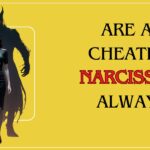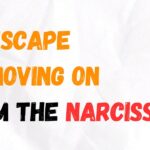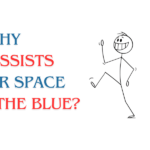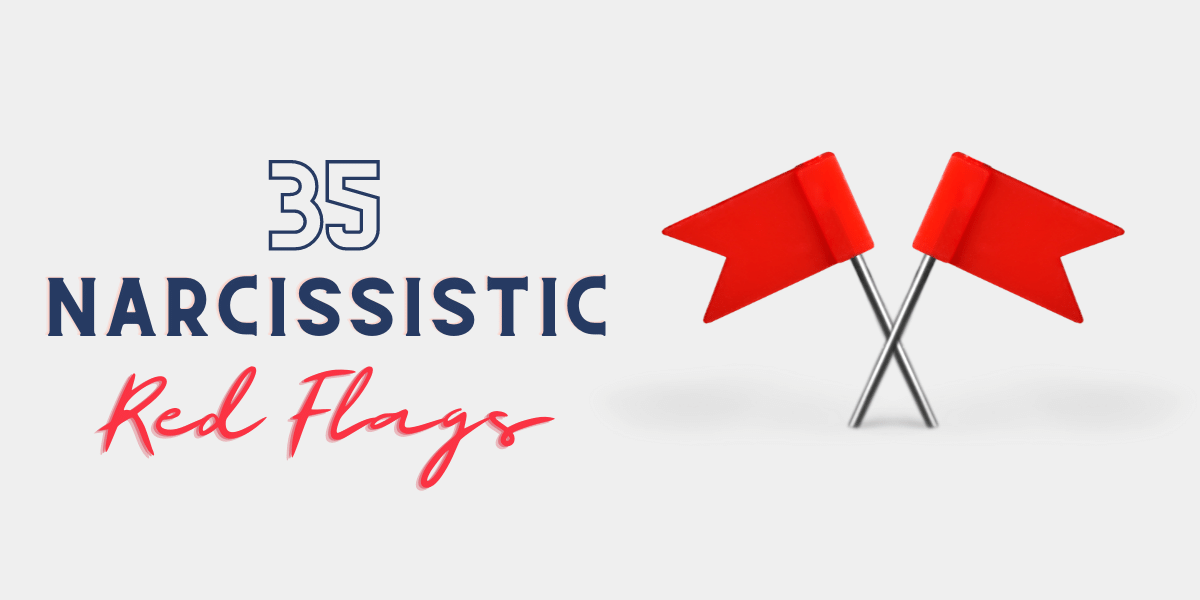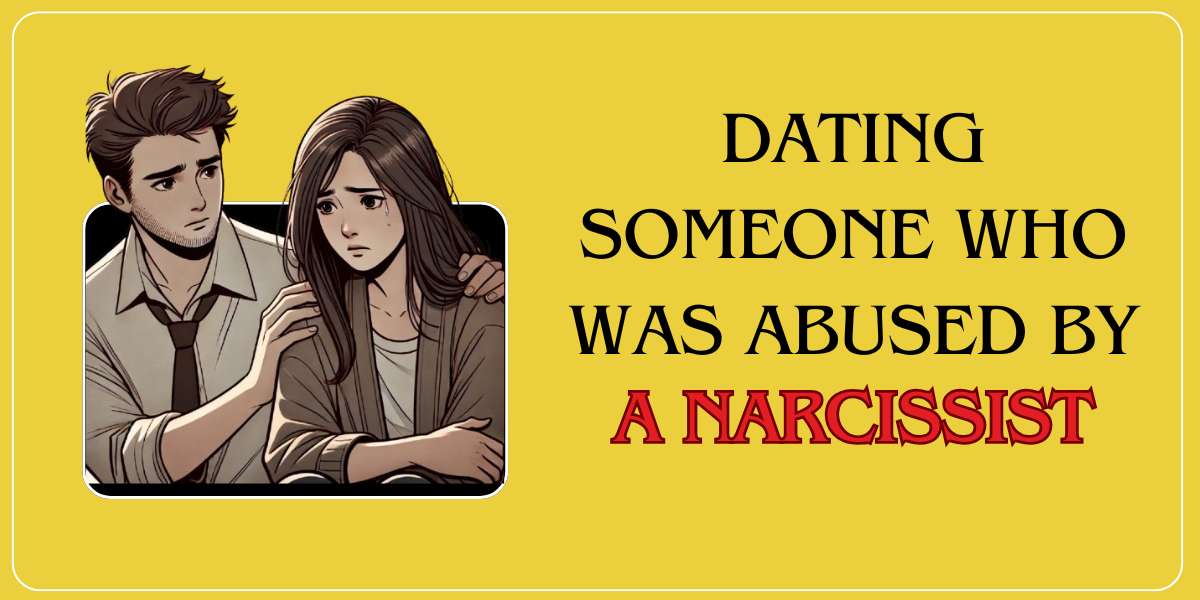Identifying the narcissist at an earlier stage is not something that always happens. Survivors wish they knew about the red flags of the narcissist earlier and avoided the narcissist. But it isn’t that easy to find snakes in the forest, isn’t it? This article lists the narcissistic red flags for you to resemble your past, learn in the present, and be ready for the future.
Red flags of a narcissist are often neglected by the people’s ignorance and love for the person. The one who ignores the red flags is the one who gets trapped in an abusive relationship. Since narcissists are masters at manipulating you and hiding their noxious secrets, ignoring the red flags isn’t your fault. Apart from all that, you are now looking for solutions, learning about narcissism, and healing from those abusive experiences. Let’s spread awareness about the narcissistic red flags and help the community avoid narcissists.
What are narcissistic red flags?
For people who wonder what this is, Narcissists cannot hide their true selves forever, and so, within the time being, their behavior will get exposed either by themselves or through the circumstances. Knowing about narcissistic red flags will help you indicate the narcissist far quicker and evade an abusive relationship.
What are the red flags of a narcissist?
We are delving into several red flags you probably encountered before or may experience in the future. So, take note or download the narcissistic red flags checklist given below to refer to it throughout your life.
Just a reminder, if you find any narcissistic red flags here relevant to what you have experienced, feel free to vent it on the comment section. This platform is for you to vent out your emotions. Let’s share our thoughts and help the community.
Note the red flags given in this article, analyze the person, and note it on the checklist if you have doubts like
“Am I dating a narcissist?”
“Are my parents narcissists?”
“Why am I getting traumatic experiences around the people I love?”
“Are my friends toxic?”
1. The look of Narc’s friends on you
Narcissists most likely don’t bring their friends to your life. But if they tend to do, the narcissist probably wants to exhibit their socializing skills. On such occasions, narcissists’ friends’ eyes will tell stories about your narc’s past.
It’s not the eyes of the narc’s friends that hate you but surprisingly, they see you in a pitying manner. If you looked closely, you could feel the doubts in their mind, like, “How does she even end up with him?” You know that they knew something about your Narc partner, and that is how the friends of narcissists are.
2. Have very low to zero friends
There are different types of narcissists but possess similar abusive patterns. The only difference is their personality and red flags. The grandiose and malignant narcissists usually have more friend circles to get the center of attention between others. But covert or vulnerable narcissists keep their traits hideous by having no one around them. Such narcissists treat their friends so badly that no one wishes to stick with them.
Even though they claim to have friends, they won’t let you interact with them. If you tried to interact, you could feel that the friends are not even close and rarely even acquaintances.
3. Doesn’t like your friends
Narcissists hate the victim with support. So, they manipulate you to give full attention to them, leaving your friends behind. They often refuse to interact with your friends and project them as toxic ones. Narcissists fear your friends’ questioning eyes and get anxious knowing that you have external support.
4. Double standards for the friends of the opposite sex
Narcissists are very good at triangulating people and playing with their emotions. They intentionally introduce someone of their opposite sex and make you feel jealous. But in your case, you just cannot even introduce a genuine friend of the opposite gender to the narcissist. If that happens, the narcissist will try to project you as a cheater by saying,
“Oh, who’s that guy you are close with? Are you planning on cheating me?”
“You are flirting with her like she’s your girlfriend.”
Narcissists do this as they want them to be the only opposite gender you must rely on. This is one of the crucial narcissistic red flags to notice; otherwise, they would spoil your whole friend circle of yours.
Read: Are Cheaters Narcissists?
5. Never hangouts with your people
If you are in a relationship, you are probably dreaming of a future with your partner, and that’s what love is. But narcissists do not see any future with you despite seeing you as a controlling toy. So, engaging with your people can lead to trouble in the future. To avoid this, narcissists avoid hanging out with people close to you, especially your family.
So remember this red flag,
One who is not ready to meet your people does not wish your life to be good either.
6. Dislikes anything you like
When you start dating a narcissist, it looks like everything goes as you intend to be. They resonate with whatever you like and project it as you both have a lot in common. But in time, the red flag will appear right in front of you. The narcissist will always dislike anything you like; for example, if you like a popular show and so does everyone, the narcissist won’t.
The narcissist will ask you to change your perceptions to what they like; otherwise, they refuse to spend time with you. This act of the narcissist is to test their control over you, especially at the beginning of the abuse. (Mention what your narcissist likes in you at first but dislikes later in the comments).
7. Monologues about themselves
Narcissists can hide anything but not their sense of grandiosity and entitlement. They are self-centered people who have inflated self-esteem. So, whatever the narcissist talks about, it is always “me, myself, I.” Narcissists are not great listeners as they don’t want to hear others’ wishes, dreams, and feelings.
Instead, they insist on bringing themselves into the topic and monologue about themselves in any conversation you discuss with them. The discussion with narcissists will always be one-sided, ignoring your feelings and requests. Monologues of narcissists can happen on the first day of your date, so be conscious of the red flag while engaging with them.
8. Admits about their traits
Narcissists are proud of how they are, and so they blatantly accept that they are evil, toxic, self-proud, mentally ill, and narcissistic. Narcissists are more charming at the start of any relationship and so, many of us miss seeing this red flag.
Most narc survivors used to regret ignoring this red flag, but anyone in that position would have done the same. We empaths assume that one who acknowledges their traits tend to correct it, but it is not the case with narcissists.
You may have ignored this trait previously, but be cautious enough to note this red flag next time.
9. Always be negative
Being negative most of the time is a clear red flag to indicate vulnerable or covert narcissists. The covert or vulnerable narcissist has no empathy and always has a sense of anxiety and shame. These people are insecure about everything they have and seek immense validation to survive. They have significantly less to zero personal growth and promote negativity all time. They fear the after-effects of even simple things and choose to avoid loss or shame.
This type of red flag is often found in covert narcissists as they try to seek validation from their partners by promoting negativity and inability to do things.
10. Always try to cross your boundaries
You may not have a well-built boundary during the relationship with the narcissist. But everyone has some rules/habits that we like to have. The narcissist will try to push those buttons to see how strong your boundaries are around them. For example, if you don’t want anyone to use your cosmetics, or if you hate others waking you up in the early morning, the narcissist will do that and laugh it off if you get angry.
Yes, these might look like simple things initially. But starting from this will lead to the days when they laugh it off your emotions, scream, and cries.
11. Mocks you in front of others
Having a friendship with narcissists is one of the exhaustive things in life. They treat you as not more than a tool to use and control as they wish. Narcissists love attention in a group. So, they try to attract people by acting funny and trolling people close to us. The trolls aren’t simple but reveal our secrets and insecurities in front of others.
If you react, you can expect them to say,
“Chill dude, it’s just a joke.”
“You can’t even take a joke, lol.”
“Are you a child to take this into a serious issue?”
These are the dialects you get from the narcissist in return.
But, when you mock them around in a funny manner, be ready to face the rage in the narc’s face as they can’t even take a joke for real.
12. Never forgets what you did
One of the major red flags of narcissists is that they cannot forget any simple narcissistic wound like not supporting them for fighting with a neighbor that hurts their self-pride. Narcissists won’t forget those scenarios and always bring them to provoke you into a fight. They bring back that irrelevant past scenario to make your point useless and control you during the argument.
View this post on Instagram
13. In desperate need of attention and validation
If anyone knows this is a red flag, they can easily indicate a narcissist too quickly. Being needy for attention and validation is the typical red flag for any narcissist. Some narcissists, like malignant and grandiose, try to do random stunts maliciously to gain attention. Whereas the vulnerable and covert narcissists directly ask for it by acting codependent and obsessive.
14. Bunch of Fake promises
When it comes to narcissistic relationships, it is filled with a bunch of fake promises. It doesn’t look like a red flag as they keep procrastinating the promises they made until the abusive phase starts. The faking of promises is known as future-faking to get our hopes high on the relationship. Promises are more valued in a romantic relationship, isn’t it? The narcissists understand that and pour promises like
“I’m waiting for the day to meet your parents to talk about our marriage.”
“I want to give you a most valuable gift next Christmas.”
“I will love you forever, have two kids with you, and be happy for the rest of our lives.”
15. Flirty from the start
Being flirty with a person you love isn’t wrong, but not at the initial “get to know” stage. Narcissists are dared to flirt with their friends and manipulate them into relationships. They may look charming at the first impression while flirting, but they also get bored within a concise period. The red flag is that the narcissist persists in flirting back quickly and validating their flirting skills.
16. Rushes in Love
Most narcissistic relationships happen too quickly, from the start of the relationship and the abusive process. Narcissists hate things that take patience, passion, discipline, and determination. That is why they don’t like to work hard to be successful. Although successful narcissists are talented, they cheat or consume others to achieve something.
They want everything quickly, and so, the narcissists hassle in relationships and expect you to cope with it. If they flirt, you must too, or if they say ‘I love you,’ you should too; That is how narcissists want the relationship to be going.
“Love you” is the word narcissists throw around like tossing food to the pigeons.”
17. Says their previous partners were crazy
Narcissists won’t admit their mistakes and blame shift the faults on others. When someone intends to get into a relationship, they will/should question their partner’s previous relationships. Narcissists straight up say that their previous partners were toxic and abusive. To prevent you from digging for more answers, they play the victim card by saying,
“I don’t want to remember the past.”
“Don’t trigger my traumas.”
18. Will always mention about their ex
Narcissists try to deplete your self-worth by all means. As a first step, your narcissistic partner will bring their previous partners into conversations. The context of the conversation will always be comparing you with their exes. Although they don’t blatantly compare you, but say things that make you insecure of things you never thought of and down your self-worth.
“I can’t forget how strong my ex’s voice was; yours is good tho.”
“My ex is really good at sex; I can even remember how my last sex is with him.”
19. Have multiple social media accounts to stalk
Romantic relationships with narcs are toxic as they are engaged with their previous partners. Although the narcissists’ ex moved on, the narcissist won’t, which will also happen after you get separated. The narcissist will eventually start stalking you and may continue forever. They use social media to stalk over their exes (including you) to see how they are progressing in their life.
Having multiple social media accounts is a big narcissistic red flag! Whatever they may say to convince you.
View this post on Instagram
20. Being overly sexual
Sexual narcissists are more likely to have drug addictions and sexual cravings than other types of narcissists. They are self-assured in their sexual abilities and are usually good in bed. They may treat their partners as if they were a sex machine, threatening to leave you at any time if you refuse.
They just try to speak about sex and turn every instance into a sex time. Being romantic is cool, but over-sexual is not, remember. The narcissist doesn’t want you but wants sex with you. The time when you realize that you have been used, the feeling of betrayal is worse than a breakup.
21. Criticize people who aren’t talented as them
Dealing with narcissists at the workplace leads to stress and anxiety, resulting in a toxic work atmosphere. You can see straight away that some people just casually disrespect you for not knowing something. Such actions are to be marked as a red flag. Even though they intend to teach you after, they always try to devalue you. Simultaneously, the narcissist will tend to allot more work to add pressure and find a reason to disrespect.
22. Silent Treatment if you confront
So, while confronting someone, keep an eye out for narcissistic red signs. If you confront a narcissist about their behavior, they will usually respond in one of these ways. Firstly, they will go silent and ignore you unless you stop confronting them. The other will be listed as a narcissistic red flag below.
While confronting a narcissist, their strong self-esteem prevents them from admitting their errors. As a result, they feel threatened and annoyed when their superior intuition is questioned and harmed. They opt to ghost you as a form of retaliation for confronting them until you apologize for no apparent reason.
23. Twists the reality
One can often witness this narcissistic red flag inside a narcissistic family. Narcissists twist the reality as the situation never happened or are portrayed differently when you confront them. They change the scenarios that suit their agenda.
For example, if you have a narcissistic mother-in-law, and you confront her for disrespecting you in front of your husband; She will casually respond,
“I will never say that; my son knows about me.”
“Why are you lying? Are you planning to separate my son and meme and my son?”
“Hey, son, I never intend to disrespect her; I said it in a lovely manner being her mom.”
If your husband is an enabler of your narcissistic mother-in-law, she can easily manipulate him and act like a victim.
24. Try to turn you into codependent
This narcissistic red flag is commonly found with malignant or grandiose narcissistic parents or spouses who try to turn their victims into codependents. They will do all your tasks while devaluing you parallelly to imply that personality. They never intend to teach moral values and good habits to the victims in the first place.
For example,
The narcissistic parent will always restrict their child from doing anything of his own choice. He will be regulated to always ask for permission.
Read How to save a child raised by narcissistic parents?
In a relationship, the narcissist will slowly turn you into a codependent by projecting you as a weak person who always needed extended support.
You may always hear dialects like,
“You don’t make good choices, you always need me to help you.”
“no one is nice as to you as I am. “
25. Apologize and expects an instant forgiveness
You might think that the narcissist never apologizes, they do, but the words of apology have no guilt or remorse and will be self-centered. E.g., “I’m sorry that I made you feel that way.” However, when the narcissist apologizes, they will ask for immediate forgiveness and interact with them as usual. It looks like expecting a toy to dance after changing the battery.
The urge to control you whenever they want is a narcissistic red flag you should never miss. Consequently, if you refuse to forgive them, the narcissist will end up projecting you as a rude, arrogant, and abusive person for not forgiving them.
“Even though I apologized, you wouldn’t forgive me; that’s so rude of you.”
“I’m apologizing for our relationship, and you are trying to destroy it.”
26. Mentions past traumas as an excuse
If the apology part didn’t go well, then the victim part will do, is the mindset of the narcissists. So they play the victim card mentioning their past traumas as an excuse which is a narcissistic red flag. One cannot define their malicious behavior by their past traumas. Accepting such excuses disrespect the people who strive above their traumas and progress in their lives by attaining self-growth.
View this post on Instagram
27. Show no empathy when we meltdown
Your partner/family member may cry, ask for your presence when they are down, or always looks obsessed with you. But, when you meltdown, if they were rude or expressed no reaction, that is the biggest red flag for someone to be a narcissist. Since narcissists have no empathy, they never try to understand their partner’s emotions. They even get annoyed by the fact that you are upset and can’t give attention to them for a period.
28. No will to change
We all know that “change is inevitable,” and that is you are trying to undo the narcissistic trap. But, narcissists have no intention to change as they are proud of their traits. Narcissists always hate results that take time, like genuine success, healing, and personal growth. So, if a person denies changing or fails to change even though they had promised, take it as a narcissistic red flag.
Narcissists hate the word “change” and might freak out if you ask them to change. Some repetitive dialects that narcissists would say if you asked them to change are,
“I would never change; that’s my policy.”
“I won’t change for anyone; if you truly care about me, change yourself.”
“Don’t ask me to change; there is nothing wrong on my side; you are the one who should change.”
29. I Need Space
You may raise the opinion that giving space to your partners is a healthy thing. Obviously, it is. However, narcissists ask for space in certain circumstances that you can easily indicate as a narcissistic red flag. They ask for a space at the initial phase of the ghosting/ narcissistic discarding.
Why do narcissists ask for a space? Mac Davidson, a former therapist and Narcissism expert says narcissists ask for space so that you don’t see what they do when you aren’t around. The narcissist may want to control you, test your boundaries, or be busy with other partners and doesn’t want you to know about it.
30. Calls us Suffocating if we ask for attention
Narcissists ask for an infinite supply of attention and validation but never return it back. If your partner seems to be like that, and when you decide to put your self-worth in front and ask for attention, if they get annoyed and call you needy, obsessive, suffocating, etc., consider it as a narcissistic red flag.
“Don’t always stick around me; you are so attached to me.”
“Don’t be over-obsessive.”
“Don’t drink down my throat.”
were some hurting dialects narcissists may use during this situation.
31. Having an enabler family member or friend
A narcissistic enabler is one who is closer to the narcissists, validating their actions and giving perennial attention by assuming the person is right and the victims are at fault. Narcissists use enablers to abuse, conduct smear campaigns, triangulate, and hoover back the victim.
It is a narcissistic red flag if you find such a person with them who always validates their wrong behaviors. You can often find an enabler as siblings, parents, friends, etc.
32. Neglecting responsibilities
Narcissists adapt themselves to survive by hiding the shame and trauma rather than accepting and gaining self-growth. This is why narcissists neglect to hold themselves accountable for their actions and be responsible. Instead, they gaslight and blame shift others to avoid conflicts and responsibilities.
Finding someone who doesn’t take responsibility is easy as you can see that they blame-shift others and try to escape. If you find someone, mark it as a narcissistic red flag.
33. Treats your Pets bad
Do you have a pet that you love more than anything? If yes, the narcissist may not like that. Narcissists initially seem to adore your pet, but they become ruder to them soon. At worst, narcissists may even punish your pet instead of punishing you.
Why are narcissists rude to your pet? Narcissists are self-centric and want their victims to give their full attention to them. No matter who they were, or what it looked like, they compete with what diverts your attention from them. The narcissists might be more abusive around both you and your pet. So, if you find someone acting rudely towards pets for no reason, consider it a narcissistic red flag.
34. Impose Physical attraction into kids
Children raised by narcissistic parents possess similar characteristics to their parents. One of them is that they are more concerned about exterior beauty and ignore the growth of personality. This results from narcissistic parents who give more importance to physical attraction. You can indicate this narcissistic red flag if you see parents who exhibit their bodies and be proud of them.
Narcissistic parents may also compare their kids to others who are physically attractive and set high expectations. So, the kids of narcissists transform into one who is obsessed with how their body looks. Psychologists say that promoting body positivity excessively also can lead to such a phenomenon.
35. Glamourize their death
If the narcissists’ plan to gain control over you fails, they intend to do emotional blackmail and glamourize their death. Situations like these often happen with the narcissistic mother, mother-in-law, grandmother, etc. They trap you under the narcissistic trap with dialogues like
“You will understand your mother’s love only after I die,” says while living healthier.
“I can sacrifice my life right now for my family,” you can’t even sacrifice your self-pride.
“I’m sick and will probably die in a month, please come and visit me,” I’m sick of you all my life.
In the end
Those mentioned above narcissistic red flags are some crucial things to notice with people around you. Anyone like your colleague, workmates, parents, relatives, siblings, partner, or friends can be narcissistic. So, download the checklist below to keep you reminded of those red flags to escape narcissistic abuse. If you find this info helpful, drop a comment below for our survivor community.
Note: Do not hold on to a hurtful relationship until you check every red flag in this checklist. If it is hurtful, you shouldn’t be there, protect yourself, heal faster, and have a happy life.
Here is the preview of the narcissistic red flags checklist.
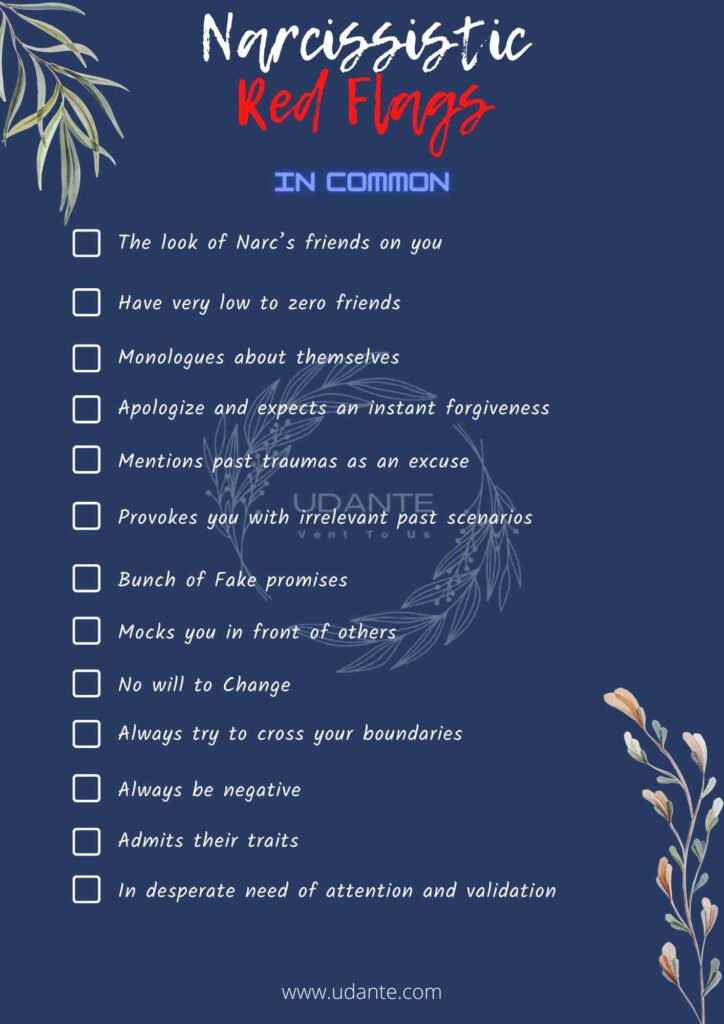
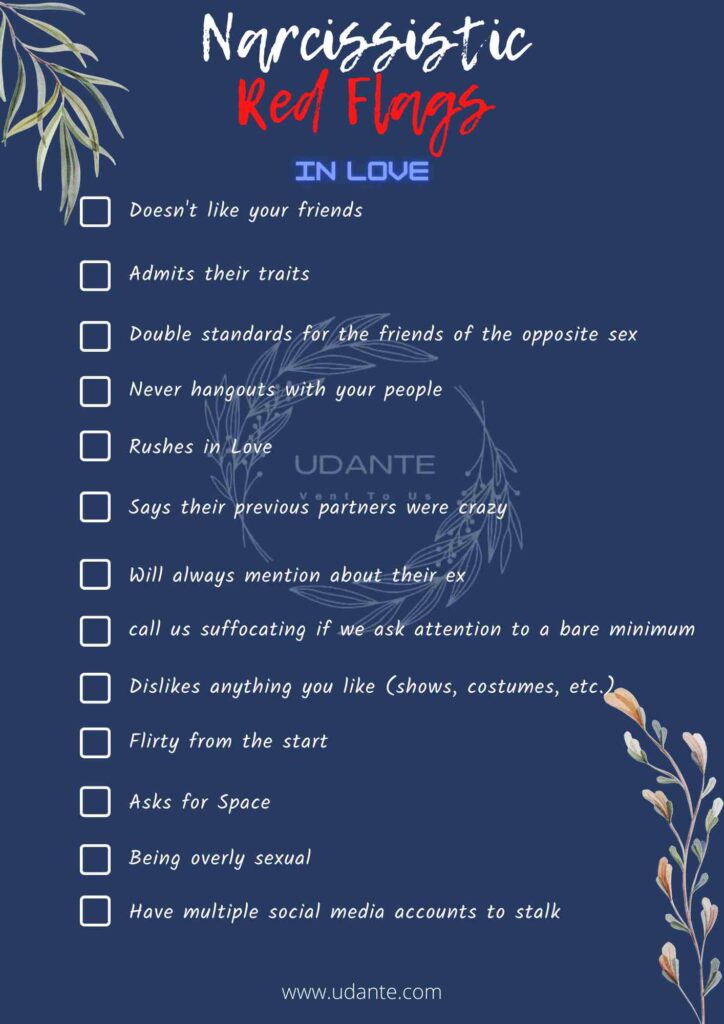
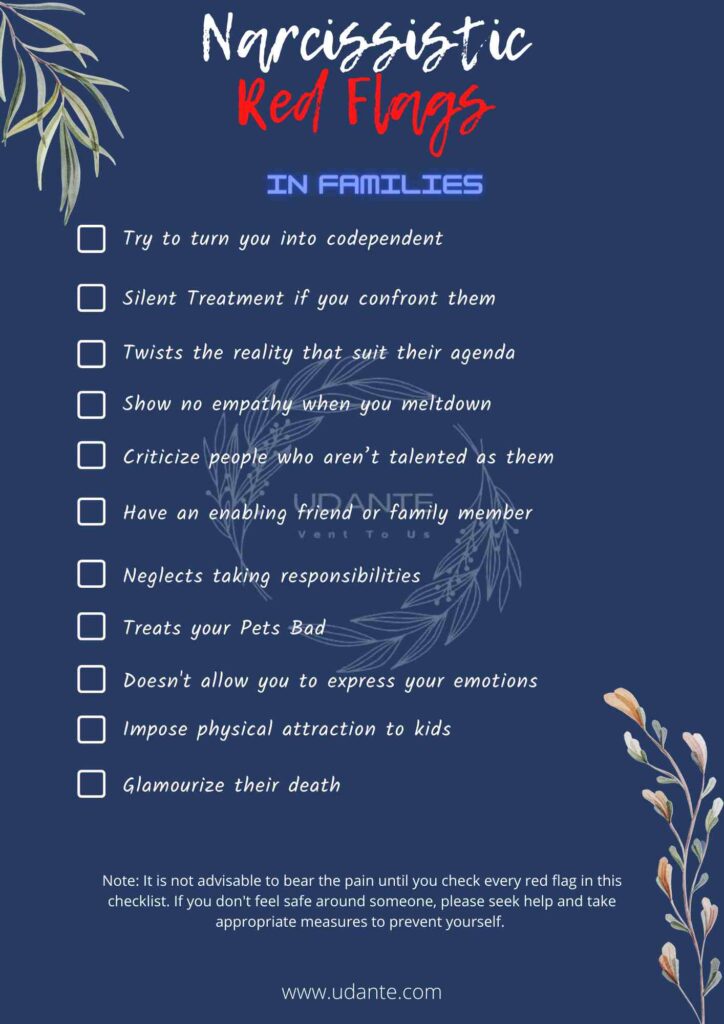
Just fill in the contact and the Narcissistic Red Flags Checklist PDF will download automatically.


